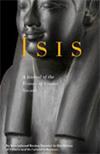Making Microbes: Theorizing the Invisible in Historical Scholarship
IF 0.9
2区 哲学
Q2 HISTORY & PHILOSOPHY OF SCIENCE
引用次数: 0
Abstract
From ancient theorization about invisible forces to the advent of modern microbiology, the pursuit of a detailed understanding of organisms invisible to the human eye has been a recurrent focus in philosophical and scientific communities and beyond. This article interrogates some of the dominant themes of historical scholarship in this area, highlighting in particular the increasing recognition of the social dimension of microbes and microbial science. It also reflects on the porosity between pre- and post-bacteriological concepts of disease and disease causation, noting the continuity of practice observed by many historians of the modern period. Since we are at present grappling with a crisis of antimicrobial resistance, long in the making, the article draws together scholarship which helps us to make sense of how science has framed microbial organisms and our interactions with them. This provides a platform for researchers to explore new responses to contemporary microbiology, as well as find new ways to interrogate past trends.制造微生物:历史学术中无形事物的理论化
从古代关于无形力量的理论到现代微生物学的出现,追求对肉眼看不见的生物体的详细了解一直是哲学和科学界以及其他领域反复关注的焦点。本文探讨了这一领域历史学术的一些主要主题,特别强调了对微生物和微生物科学的社会维度的日益认识。它还反映了疾病和疾病原因的前和后细菌概念之间的空隙,注意到许多现代历史学家观察到的实践的连续性。由于我们目前正在努力应对一场长期存在的抗菌素耐药性危机,本文汇集了有助于我们理解科学如何构建微生物有机体以及我们与它们的相互作用的学术成果。这为研究人员提供了一个平台,以探索对当代微生物学的新反应,并找到新的方法来询问过去的趋势。
本文章由计算机程序翻译,如有差异,请以英文原文为准。
求助全文
约1分钟内获得全文
求助全文
来源期刊

Isis
管理科学-科学史与科学哲学
CiteScore
1.00
自引率
16.70%
发文量
150
审稿时长
>12 weeks
期刊介绍:
Since its inception in 1912, Isis has featured scholarly articles, research notes, and commentary on the history of science, medicine, and technology and their cultural influences. Review essays and book reviews on new contributions to the discipline are also included. An official publication of the History of Science Society, Isis is the oldest English-language journal in the field.
The Press, along with the journal’s editorial office in Starkville, MS, would like to acknowledge the following supporters: Mississippi State University, its College of Arts and Sciences and History Department, and the Consortium for the History of Science, Technology, and Medicine.
 求助内容:
求助内容: 应助结果提醒方式:
应助结果提醒方式:


